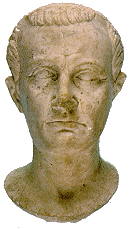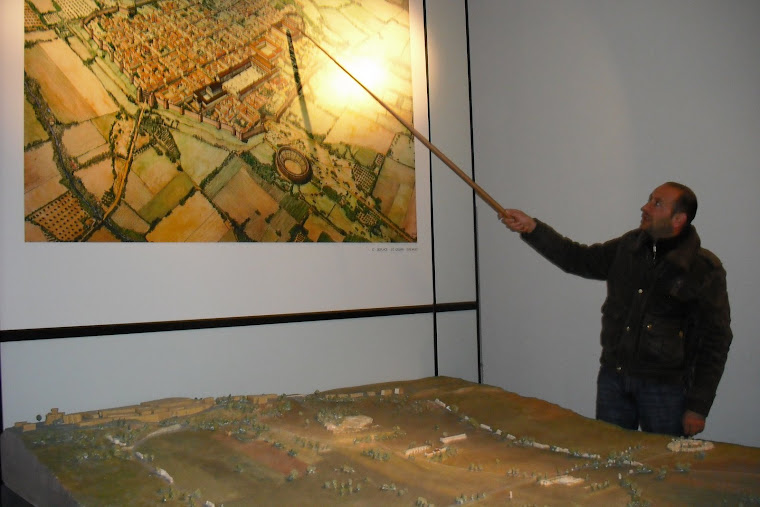
Urbis Salvia, roman town of the Regio V (Picenum) was probably founded in the first half of the first century B.C. in a site where were not found any traces of settlements previous to the Roman time, even if the surroundings are full of Picene remainings.
As it happened in the Roman habit, the reasons for the foundation of the town are to be sought in its strategic position: at the crossroad of two important roads, the one linking Firmum (Fermo ) to Septempeda (San Severino Marche) and the road that via Ricina (Villa Potenza) lead from Asculum (Ascoli) to Auximum (Osimo).
Urbs Salvia was a municipality under the Republican period and it became a Colony under Augustus. It was part of a tribe named Velina.
Its colony status is confirmed by two inscriptions found on the outer walls of the Anphytheatre during the excavations. During the first half of the first century B.C. the town was at its greatest splendour. By that time many important descendants of some famlilies coming from the territory of Urbs Salvia, had taken over in key positions in Rome and contributed with many donations to the artistic development of the town.
After the town was destroyed by the Barbarians in the sixth century A.C., it was abandoned and for defensive reasons the people went to settle on the hilltop where Urbisaglia stands today.
This prevented that the ruins of the old Roman town were completely replaced by the new settlement. In this way Urbs Salvia has reached the present days as the most important archaeological site of the region, in a landscape not very dissimilar from the ancient one.
Urbisaglia was founded by the survivors of the destroyed roman city who settled on the surrounding hills giving birth to the "Castro di Orbesella".

In the thirteenth century the town was dominated by the Abbraciamonte family. Gualtiero Abbraciamonte in 1195 gave Villamagna to Matteo and Forte Offone.
This deed was the cause of all the future evils. In 1199 Matteo and Forte Ottone gave Villamagna to Tolentino.In 1213 Gualtiero gave Tolentino also his share of the Castle of Urbisaglia.
This was an habit that even all Gualtiero'sons were to take: they all gave away their share of the Castle. The first was Rosso in 1252, than his son named Rosso as well in 1290, Gualtiero in 1293 and again in 1296 Silimbene di Marino. The action of complete submition was accomplished by Fildesmido. The great Urbisaglia under the dominion of Tolentino, fell in awful conditions. Even Dante in the "Paradise" (chant XVI) writes of the town decadence:
Se tu riguardi Luni ed Urbisaglia
Come sono ite, e come se ne vanno
Di retro ad esse Chiusi e Sinigaglia,
Udir come le schiatte si disfanno
Non ti parrà nuova cosa né forte,
Poscia che le cittadi termine hanno.
For a century and a half the people from Urbisaglia bore the tirany of Tolentino, until 1436, when they passed under the more acceptable Lordship of Elena Tomacelli, the niece of Bonifacio V, and the wife of Taliano Furlano, a captain of mercenary troops.

Once the Lordship of Francesco Forza (of whom Furlano was a captain) in the Marche region was over, the town of Urbisaglia was restored to the rule of Tolentino. This lasted until 1569, when the noble Giulio Fedeli from Macerata could take possession of the town for the Apostolic See.
In 1696 the peace was established between the towns of Urbisaglia and Tolentino.









Leonardo, grandissimo oratore
RispondiElimina